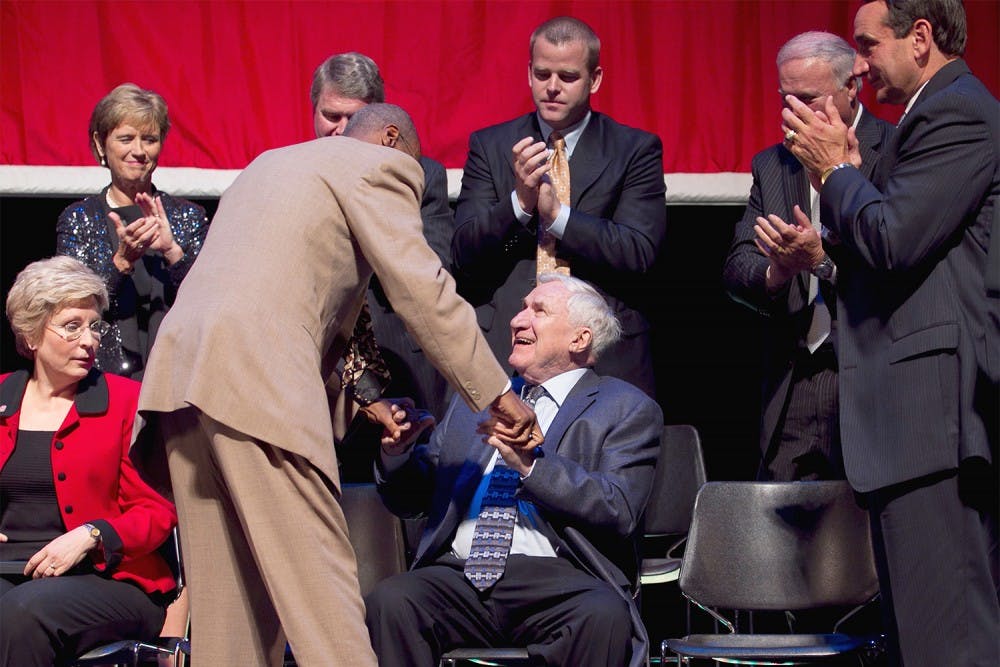“To us, and to me, he was just being Coach Smith,” said UNC basketball legend Phil Ford, who played for Dean from 1974-78. “He was just being the good, honest guy that wanted everyone to be treated fairly.
All about opportunity
Charlie Scott has been asked the same question about a million times.
How did it feel to be the first black scholarship athlete to play at UNC? Dean recruited Scott, who achieved that feat in 1967.
Scott’s answer to this question has always remained the same.
“Coach Smith never treated me like the first African-American to go to the University of North Carolina,” he said. “It was all any person would want to be treated like — like everybody else.”
Dean might have treated Scott just like any one of his players, but when others treated Scott differently because of his race, Dean had to change his ways ever so slightly. The usually calm and collected Dean disappeared.
David Chadwick, a teammate of Scott’s from 1968 to 1971, remembers one game when the team played in South Carolina and a fan directed racial slurs toward Scott. Dean’s reaction: “We had to hold him back,” Chadwick said.
Hubert Davis, one of Dean’s former players and a current assistant men’s basketball coach at UNC, remembers a visit from the coach when he was in high school.
“He gave me an opportunity,” said Davis, who Dean originally thought couldn’t make it at UNC.
That was Dean’s passion: helping lead people, not just his players, toward opportunity.
Dean helped then-UNC graduate student Howard Lee move into an all-white Chapel Hill neighborhood after Lee arrived in town in 1964. Lee later became the first black mayor of Chapel Hill in 1969, and along the way Dean supported him.
To get the day's news and headlines in your inbox each morning, sign up for our email newsletters.
“It was a tough process,” said Lee of buying the house. “We were threatened, our kids were threatened, we even had a group of teenagers burn a cross on our lawn one night...
“He was a person committed to doing what was right.”
During his 83 years, Dean participated in sit-ins. He protested the Vietnam War and pushed for the United States to reduce its production of nuclear weapons.
In 2013, Dean received the Presidential Medal of Freedom — the nation’s highest civilian honor.
“He was very soft-spoken, very active politically,” said UNC women’s basketball coach Sylvia Hatchell.
For ESPN’s Bomani Jones, Dean’s legacy extends further than college basketball.
“I think you could make an argument that Dean Smith is the most significant resident of the state of North Carolina of the 20th century,” he said. “When you start looking at the advancement socially that he was behind, the significance of him being who he was, taking the stances that he was willing to take and what some of the ultimate effects of those happened to be. With that, I think there’s a legitimate case that there’s been no person more important to the history of the state than he was in the 20th century.”
The man they knew and loved
Roy Williams has countless memories of Dean. Like he did for Scott and Lee, Dean also gave Williams a chance. He’s the reason why Williams can call himself one of Dean’s successors as head coach of the North Carolina basketball team.
But Williams especially remembers when he told his 11th grade U.S. history teacher, Buddy Baldwin, that he wanted to go to UNC.
“Well, that will be good for you because you’ll be able to learn some things from Coach Smith,” Baldwin responded.
Maybe the most important lesson Williams learned during his 10 years as Dean’s assistant coach was that it’s what a coach does off the court that truly matters.
“He was successful,” Williams said. “Sitting at the cafeteria counter was more important than wins and losses ... It was more important to Coach Smith. It means he won.”
Scott especially cherishes his memories of the Dean Smith from off the court.
“Coach Smith was a better man than he was a coach, and that’s hard to do with all the things that he accomplished,” Scott said.
Jones wishes he could’ve met Dean Smith, the political activist.
“He was able to stand behind these things that were not in line with majority opinion,” he said. “When Dean Smith said it, it all of a sudden meant people had to listen.”
Roy Williams loved, and always will love, the person the coach truly was.
Dean Smith, the man.
“He was a much greater man than me,” Williams said. “And his whole thing was do the best that you can do, the absolute best that you can do. Don’t leave any stone unturned; do the absolute best you can do. And then live with it.”
sports@dailytarheel.com




